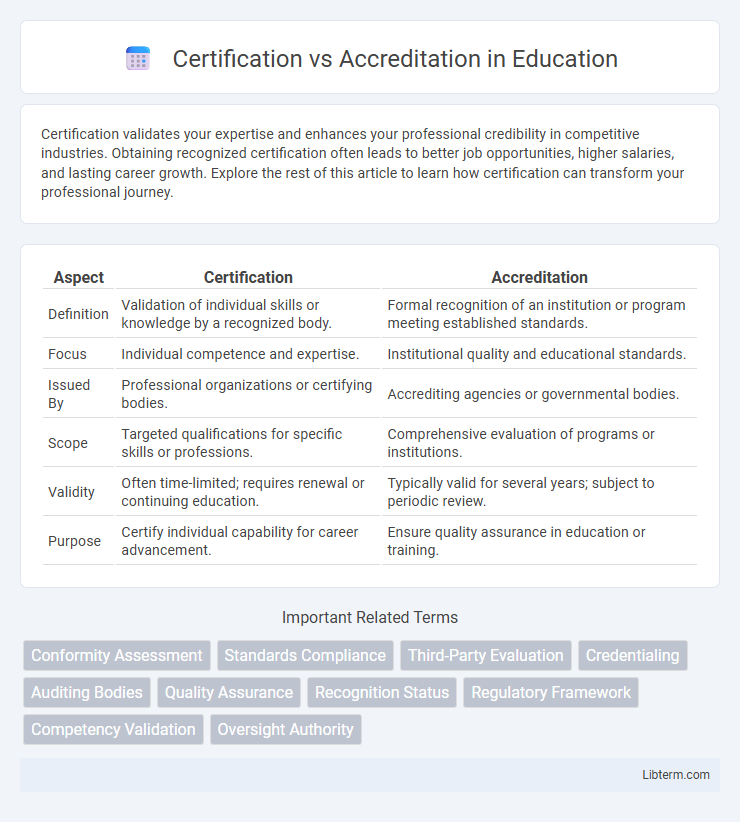Certification validates your expertise and enhances your professional credibility in competitive industries. Obtaining recognized certification often leads to better job opportunities, higher salaries, and lasting career growth. Explore the rest of this article to learn how certification can transform your professional journey.
Table of Comparison
| Aspect | Certification | Accreditation |
|---|---|---|
| Definition | Validation of individual skills or knowledge by a recognized body. | Formal recognition of an institution or program meeting established standards. |
| Focus | Individual competence and expertise. | Institutional quality and educational standards. |
| Issued By | Professional organizations or certifying bodies. | Accrediting agencies or governmental bodies. |
| Scope | Targeted qualifications for specific skills or professions. | Comprehensive evaluation of programs or institutions. |
| Validity | Often time-limited; requires renewal or continuing education. | Typically valid for several years; subject to periodic review. |
| Purpose | Certify individual capability for career advancement. | Ensure quality assurance in education or training. |
Understanding Certification and Accreditation
Certification validates an individual or organization's competence by confirming they meet specific standards set by a recognized body. Accreditation ensures that institutions or programs comply with established quality criteria and are authorized to operate or offer services. Understanding the distinction clarifies that certification applies to people or products, while accreditation pertains to organizations or systems.
Key Differences Between Certification and Accreditation
Certification primarily evaluates and validates the competence of individuals or products according to specific standards, while accreditation assesses the credibility and quality of organizations or programs based on established criteria. Certification is typically awarded by independent certifying bodies after successful assessment, whereas accreditation is granted by authoritative agencies that monitor compliance with industry-wide benchmarks. The fundamental difference lies in certification's focus on meeting competency requirements and accreditation's emphasis on overall institutional reliability and quality assurance.
Purposes and Objectives of Certification
Certification serves to validate individual competencies, skills, and knowledge against established professional standards, ensuring credibility and trustworthiness in a specific field. It aims to enhance career prospects, promote continuing education, and provide a benchmark for employers to assess qualifications reliably. Certification also supports industry consistency by confirming that certified professionals meet rigorous criteria and adhere to ethical practices.
The Role of Accreditation in Quality Assurance
Accreditation plays a critical role in quality assurance by providing formal recognition that an organization meets established standards of competence and reliability. Unlike certification, which validates individual products or services, accreditation evaluates the overall management system and technical capabilities of organizations, ensuring consistent adherence to industry regulations. This process enhances credibility and fosters trust among stakeholders by demonstrating compliance with rigorous quality benchmarks.
Certification Process: Steps and Requirements
The certification process involves a systematic sequence of steps including application submission, documentation review, compliance evaluation, and final assessment by an authorized body to ensure adherence to specific standards. Key requirements typically comprise evidence of meeting established criteria, successful completion of audits or examinations, and ongoing surveillance to maintain certification validity. This structured approach guarantees that individuals or organizations demonstrate competence and quality in their respective fields.
Accreditation Process: Criteria and Evaluation
The accreditation process involves a detailed evaluation based on predefined criteria that assess an organization's competence, quality management, and compliance with industry standards. Evaluators review documentation, conduct onsite audits, and analyze operational procedures to ensure consistency and effectiveness. Successful accreditation validates that the entity meets rigorous standards, enhancing credibility and trust among stakeholders.
Industries Commonly Using Certification and Accreditation
Industries such as healthcare, manufacturing, and information technology frequently utilize certification to validate individual competencies and ensure adherence to industry standards. Accreditation is prominently used in education, laboratories, and healthcare institutions to formally recognize organizations meeting established quality benchmarks. Both certification and accreditation play critical roles in sectors like aerospace, automotive, and environmental management to enhance safety, compliance, and operational excellence.
Benefits of Certification for Individuals and Organizations
Certification validates an individual's expertise and skills, enhancing career opportunities and professional credibility across industries. Organizations benefit from certified employees through improved performance, increased customer trust, and compliance with industry standards, boosting competitiveness. Both individuals and companies gain a measurable commitment to quality and continuous improvement by pursuing certification.
Advantages of Accreditation for Institutions
Accreditation offers institutions a recognized standard of quality that enhances reputation and builds trust among stakeholders. It supports continuous improvement through rigorous evaluation processes, promoting excellence in academic and operational practices. Institutional accreditation also facilitates eligibility for government funding, grants, and increased student enrollment by demonstrating adherence to industry standards.
Choosing Between Certification and Accreditation
Choosing between certification and accreditation depends on the specific goals and context of your organization or product. Certification verifies that an individual or product meets predefined standards, focusing on competence or quality, while accreditation evaluates and recognizes the competence of an organization to perform specific tasks, such as testing or inspection. Understanding whether you need personal validation through certification or organizational credibility via accreditation helps ensure alignment with industry requirements and regulatory compliance.
Certification Infographic

 libterm.com
libterm.com